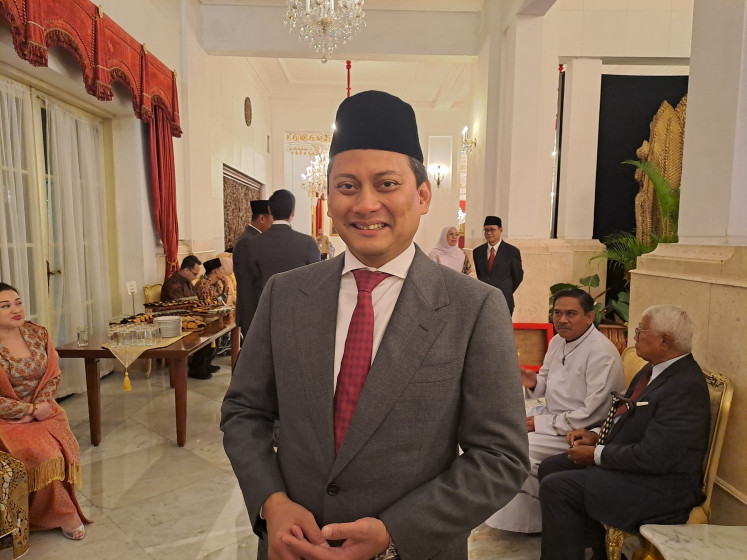Popular Reads
Top Results
Can't find what you're looking for?
View all search resultsPopular Reads
Top Results
Can't find what you're looking for?
View all search resultsCompanies cofinance sustainable agriculture to keep forests green
Businesses are working hand-in-hand with local farmers in capacity-building programs to promote good agricultural practices in a bid to ensure sustainability in the production of various commodities ranging from palm oil and coffee to cacao and spices
Change text size
Gift Premium Articles
to Anyone
B
usinesses are working hand-in-hand with local farmers in capacity-building programs to promote good agricultural practices in a bid to ensure sustainability in the production of various commodities ranging from palm oil and coffee to cacao and spices.
The Sustainable Trade Initiative Indonesia (IDH) has been working with companies, including French tire manufacturer Michelin and agribusiness company Wilmar, to train producers of rubber and palm oil, among other commodities, to adopt good agricultural practices.
The cofinancing projects are not only useful for the farmers, who are mostly smallholders, but also provide benefits for the companies, said the foundation’s Indonesia country director, Fitrian Ardiansyah.
“They [the projects] can increase farmers’ productivity, which will support [the companies’] supply chain. The cooperation with farmers will also increase their mutual trust and simultaneously reduce the risk of social conflict,” he wrote in an email correspondence with The Jakarta Post on Nov. 22.
In bridging the gap between the corporate and farmers’ needs, the IDH offers practical solutions that will allow companies, the government and other parties in public-private partnerships to finance and create sustainable agricultural projects.
Sustainability issues have recently been one of the obstacles faced by Indonesian agricultural exports. Advanced countries, such as in the European Union, where consumers are aware of how their products are sourced, cite sustainability as a requirement for imported products or commodities.
Indonesian palm oil, for example, is facing growing restrictions particularly in the EU, which decided in March to completely phase out the use of palm oil-based biofuel by 2030. The EU regards palm oil as a high-risk vegetable oil as a result of deforestation.
Fitrian said the foundation had invested 11.2 million euros (US$12.3 million) in its Production, Protection and Inclusion (PPI) initiatives for aquaculture and the production of cacao, coffee, paper and pulp, palm oil, rubber and spices, among other commodities, during the period 2016 to 2018.
“The IDH provides 30 percent of the financing while private companies contribute 70 percent,” he said.
IDH program director Zakki Hakim said the PPI was aimed at increasing land productivity while protecting surrounding forests, as well as including farmers in the sustainable-commodities value chain.
The PPI program, for instance, is implemented in a sustainable cocoa plantation in West Papua. Through collaboration with Indonesia-based chocolate producer Pipiltin Cocoa, the West Papua provincial administration, South Manokwari district administration and local farmers cooperative Eiber Suth, a product called the Ransiki 72 percent chocolate bar has been created.
The product main ingredient, cacao, comes from a 1,600-hectare plantation managed by the Eiber Suth cooperative in Ransiki subdistrict.
Cacao is the raw bean of the cacao tree, whereas cocoa refers to roasted cacao beans, which are usually turned into grinds or powder. Most widely known ready-to-eat chocolate bars are made from combining cocoa butter, cocoa solids, milk and sugar.
The PPI program in South Manokwari aims to develop a sustainable cacao plantation that also preserves forests, peatlands and key ecosystems in West Papua, and focuses on the welfare of indigenous Papuans. The local administration has issued a regulation that entails a commitment to protect a minimum of 70 percent forest cover and 50 percent of the sea and coral reefs.
“In any sustainable value chain project, it is important to have an off-taker so that we can ensure the farmers have a channel to buyers,” Zakki said.
Meanwhile, in the palm oil sector, the foundation and palm oil company PT Bumitama Gunajaya Agro have invested 1.1 million euros to preserve the protected forest area around Mount Tarakan in Ketapang, West Kalimantan. The funds have been used to acquire a neighboring company that engaged in deforestation near the forest area to stop the deforestation and expand the potential conservation area by 6,000 hectares.
Bumitama used to be blamed for deforestation, something it denied. The accusation impacted the reputation of its buyers, namely palm oil companies Wilmar and Golden Agri Resources, both of which have issued no-deforestation policies.
“It is hard when you are a compliant company among unsustainable companies because you often get associated with their [deforestation] practices. The challenge is engaging with competitors and neighboring concessions to also adopt good agricultural practices,” Fitrian told the Post.
Palm oil is one of Indonesia’s biggest export commodities, which generates $20 billion that contributed 1.5 to 2.5 percent to GDP, according to the Indonesian Palm Oil Association (GAPKI). However, palm oil plantations are often blamed for deforestation and unsustainable practices.
Despite the amount of funds allocated and the efforts it has made, the initiative needs the government’s involvement to ensure the program is long lasting. The government and local administrations, Fitrian said, should draft regulations that govern sustainable practices for all industry players in their jurisdictions.
Institute for Development of Economics and Finance (Indef) researcher Rusli Abdullah said training initiatives from the private sector could significantly help the government’s efforts to boost good agricultural practices among farmers.
"Most of Indonesia's farmers have yet to implement sustainable farming […] Private off-takers could insist on good agricultural practices and sustainable farming requirements so farmers will comply,” he said.










